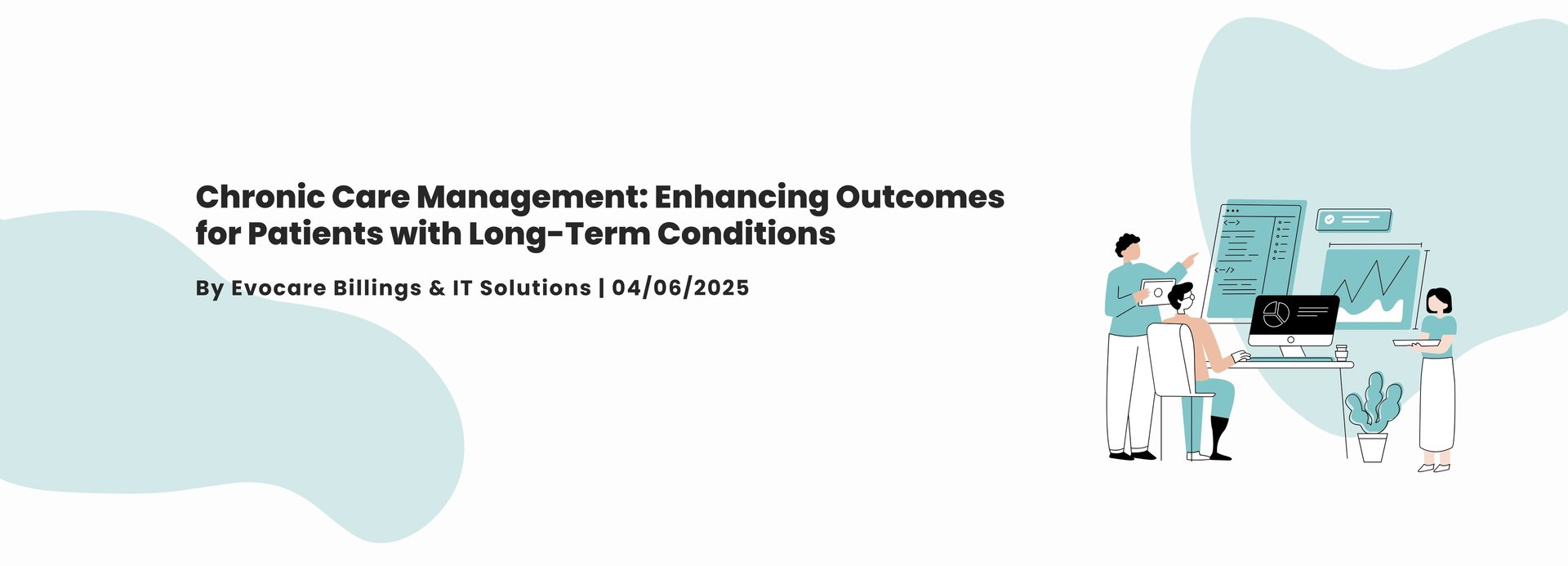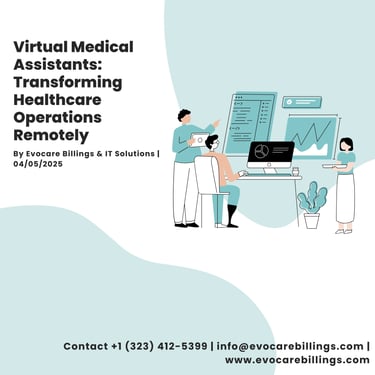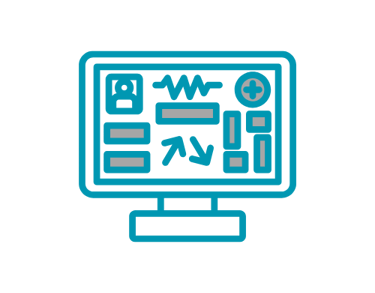
EVOCARE BILLINGS & IT SOLUTIONS

Chronic Care Management: Enhancing Outcomes for Patients with Long-Term Conditions
By Evocare Billings & IT Solutions
A Brief History of Chronic Care Management
Chronic Care Management was introduced by the Centers for Medicare & Medicaid Services (CMS) in 2015 under the Medicare Physician Fee Schedule. It was part of a broader push toward value-based care, aimed at improving outcomes while controlling costs for patients with multiple chronic conditions. Since its inception, CCM has evolved to include complex CCM (CPT code 99487 / 99489) and integrated remote patient monitoring.
Call Us Now | +1 (323) 412-5399
Get a Quote
We Are Looking Forward to Hear from You..!!


Understanding Chronic Care Management (CCM)
Personalized Care Plan Development
Providers create an individualized plan based on the patient’s health history, medications, goals, and social needs.Care Coordination
Includes communication among primary care providers, specialists, and ancillary services to ensure continuity of care.24/7 Access to Care
Patients have access to care services and urgent advice around the clock.Medication Management
Helps patients manage prescriptions, understand side effects, and adhere to their medication regimen.Patient Engagement and Education
Educates patients about their conditions and encourages self-care through routine check-ins and coaching.
Core Components of CCM Services
Who Can Provide and Bill for CCM Services?
Physicians (MDs and DOs)
Nurse practitioners (NPs)
Physician assistants (PAs)
Certified nurse midwives
Clinical nurse specialists
How to Implement a CCM Program
Yes, specialists such as cardiologists, endocrinologists, pulmonologists, and other providers who manage patients with chronic conditions can also offer and bill for CCM services. The key requirement is that the specialist must provide ongoing, comprehensive care management—not episodic care alone. They must also meet the documentation, time, and consent requirements outlined by CMS.
Benefits of Chronic Care Management
Care coordination software with patient dashboards
Remote patient monitoring (RPM) devices for vitals tracking
Secure messaging platforms for provider-patient communication
EHR-integrated task tracking for documentation and billing
Improved health outcomes for patients with chronic conditions
Reduced hospital readmissions and emergency room visits
Enhanced patient satisfaction and quality of life
Support for caregivers through education and planning
Additional revenue stream for healthcare providers
Tools Supporting CCM Delivery
Chronic Care Management is a key element of value-based care delivery. By focusing on preventive strategies and patient-centric coordination, providers can manage chronic illnesses more effectively while enhancing both clinical outcomes and financial performance. To implement CCM successfully:
Chronic Care Management: Enhancing Outcomes for Patients with Long-Term Conditions
Chronic diseases such as diabetes, heart disease, COPD, and hypertension are among the most common and costly health issues in the U.S. Managing these conditions requires consistent care, ongoing monitoring, and proactive intervention—this is where Chronic Care Management (CCM) comes into play. By coordinating healthcare services, educating patients, and promoting adherence to treatment plans, CCM improves patient outcomes and reduces hospitalizations and emergency visits.
JOIN OUR MEDICAL BILLING NEWSLETTER
Keep your practice ahead with the latest trends, expert tips, and industry updates in medical billing. Evocare Billing provides healthcare practitioners, physician groups, and hospitals with seamless billing solutions to optimize revenue and minimize claim denials. Subscribe to our newsletter and gain exclusive insights to enhance your practice’s financial success.
CONNECT WITH US ON SOCIAL MEDIA...!!
Stay informed and engaged with the latest updates in medical billing. Follow Evocare Billing on social media for expert insights, industry trends, and tips to maximize your revenue. Join our community and take your practice to the next level!
Payment Posting
RCM SERVICES
Account Receivable
Denial Management & Appeals
Physician & Facility Credentialing
Prior Authorizations
Medical Records & Fax Handling
Virtual Medical Assistant
Chronic Care Management
Insurance Verification and Eligibility
End to End RCM Services


CMS recognized that proactive, non-face-to-face services were necessary to fill care gaps and keep chronic patients healthier. By compensating providers for coordinated care efforts outside of regular appointments, CCM encourages more comprehensive care delivery.
The following healthcare professionals are eligible to initiate and bill for CCM:
Can Specialists Provide CCM?
Chronic Care Management is a Medicare program designed to support patients with two or more chronic conditions. It involves a comprehensive, team-based approach to deliver continuous and coordinated care outside of regular face-to-face visits. The goal is to maintain patients' health over time, avoiding complications and unnecessary costs.
To qualify for CCM services:
Patients must have two or more chronic conditions expected to last at least 12 months.
Conditions must place the patient at significant risk of death, acute exacerbation, or functional decline.
CCM is billable under CPT code 99490 and related codes for complex cases. Time-based billing is required (minimum of 20 minutes of non-face-to-face care per month), and informed patient consent must be documented.
These providers must establish a comprehensive care plan and maintain oversight of all CCM services delivered. Clinical staff working under their supervision (within the scope of their practice) can help fulfill the service requirements.
Identify Eligible Patients: Use EHR systems to filter patients with two or more chronic conditions.
Obtain Consent: Secure documented consent from patients for participation and explain service details.
Develop a Care Plan: Create and share an electronic care plan tailored to each patient's needs.
Engage Patients Monthly: Ensure at least 20 minutes of non-face-to-face care coordination each month.
Track Time and Documentation: Record all services accurately for compliance and billing purposes.
Use Technology: Leverage EHR-integrated tools for task management, documentation, and communication.
Modern technology plays a vital role in enabling effective CCM:
Outsourcing Chronic Care Management
Final Thoughts: A Vital Step Toward Value-Based Care
Healthcare practices can outsource CCM services to specialized partners. These vendors typically provide:
Certified care coordinators
HIPAA-compliant platforms
Documentation support and billing integration
Customized care plans based on CMS guidelines
Outsourcing allows providers to offer CCM services without burdening internal teams or compromising care quality.
Identify eligible patients through your EHR
Create workflows for monthly outreach and documentation
Train staff or partner with a reliable CCM service provider
Leverage digital tools to enhance care continuity
As chronic conditions continue to rise, a proactive CCM program ensures your patients stay healthier—and your practice stays ahead in delivering high-quality care.
Eligible Patients and Billing Guidelines
Blogs | Subscribe To Billing Insights
Enjoy Seamless Solutions, Excellent Results..!!
Earn more and get paid faster with Evocare Medical Billing's 24/7 services.
Evocare is a medical billing provider that integrates with your existing EHR system for streamlined processing.
We are honored to offer top-tier service with a 99% retention rate that sets us apart.



About Us:
We are dedicated to providing solutions that streamline operations & maximize revenue for providers. With a commitment to accuracy, efficiency & compliance, we help practice focus on delivering exceptional patient care.
Services:
Resources:
Terms & Conditions
|
|
HIPPA
ICD 10
EIN Registration 98-1830929
|
EHR:
Specialties:
FOLLOW US


And Many More..!!
